The high number of cases in the UK also reflects the difficulty of eradicating an outbreak, says Jo Middleton, a research fellow at Brighton and Sussex Medical School, who is involved in scabies research in the UK and around the globe. Bedding and furniture need to be completely decontaminated, while medicines like permethrin are not the easiest to use.
“Permethrin is a good medicine, but it’s very difficult to put on. You have to cover your whole body, leave it on for 12 hours without washing it off, and then you have to do it again seven days later,” he says. “The reality is that we see a lot of failure, where people put on this medication and end up continuing to have scabies and infecting other people, because the application is so difficult.”
In Britain, there’s also another factor at play: a months-long severe shortage of treatments. Paula Geanau of the British Association of Dermatologists told WIRED in an email that this is due to both lingering pandemic-related supply chain issues and import problems relating to Brexit. With the current high demand, any stock that reaches the UK is swiftly used up.
“We’ve seen a shortage of pharmacy supply in some UK regions, particularly in the north,” says Middleton. “It’s unclear what is causing which. Maybe there’s more cases, so therefore there’s a shortage in medicine, or it might be the other way around.”
Researchers argue that given scabies’ relatively high incidence, there needs to be more rigorous surveillance of potential outbreaks, particularly in the wake of research showing that untreated scabies can lead to secondary skin infections from streptococcus and staphylococcal bacteria. Vulnerable patients—in care homes, for example—are especially at risk, and these bacteria can even go on to cause organ damage. “There’s some links to the cardiac and renal systems,” says Head. “Not fully understood, but it does look like they are genuine, occasional secondary consequences of an initial scabies infection.”
Scabies has long been neglected, perhaps due to the unhelpful stigma surrounding it as a “disease of the unwashed.” Rates have sometimes been reported as being higher in overcrowded conditions—in camps for refugees and asylum seekers, for example. This idea may then be used to blame disadvantaged populations, without evidence, for spreading the disease.
“I’ll strongly say there’s no evidence that any rise in scabies, if it is happening in Europe, is connected to refugees,” says Middleton. “There’s been stuff in the media in the past associating refugees with bringing scabies into a country, but scabies is here, and it’s always been here. Where we see outbreaks is predominantly in care homes and among young people in universities. It’s what’s going on in those places that will explain any rise.”
This isn’t the only piece of misinformation to swirl around the disease. In the global south, scabies is managed effectively through an oral medication, a powerful antiparasitic called ivermectin. Studies have shown that two doses of ivermectin are effective at eliminating the disease in 98 percent of patients.
Yet ivermectin is not routinely used to treat scabies in the UK, something that researchers attribute to the repeated false claims regarding its potential uses for treating Covid-19. At one point endorsed by former US president Donald Trump, ivermectin’s supposed usefulness against the SARS-CoV-2 virus was never backed up with reliable evidence, and Middleton believes this is sadly now inhibiting its use in conditions where it is proven to work.
“Some people were claiming that it had efficacy against Covid,” he says. “To try and control that you had other people describing it as horse paste, because it is—like a lot of human medicines—also a veterinary drug. That then gave it a kind of bad reputation. But we are hoping it will be used more against scabies.”
In the meantime, doctors such as Ijaz are hoping that the current outbreak in the UK can be managed through more effective public health campaigns. “People can often be mismanaged,” he says. “For instance, itching post-treatment can last anywhere up to six weeks post eradication, yet people mistake this for a recurrence of scabies. This leads to them sourcing more permethrin, leading to more shortages.”

